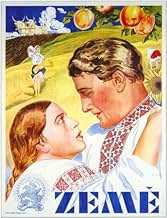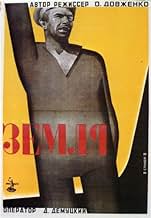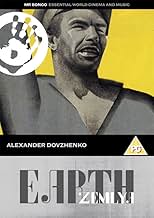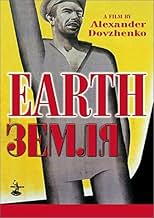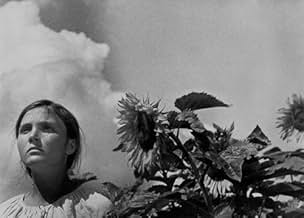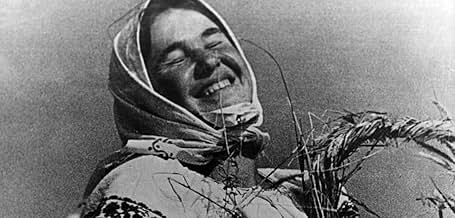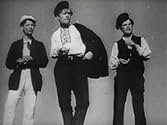ÉVALUATION IMDb
7,2/10
6,6 k
MA NOTE
Dans la campagne paisible, Vassily s'oppose aux riches kulaks contre l'arrivée de l'agriculture collective.Dans la campagne paisible, Vassily s'oppose aux riches kulaks contre l'arrivée de l'agriculture collective.Dans la campagne paisible, Vassily s'oppose aux riches kulaks contre l'arrivée de l'agriculture collective.
- Prix
- 1 victoire et 1 nomination au total
Stepan Shkurat
- Opanas
- (as S. Shkurat)
Semyon Svashenko
- Vasyl - son of Opanas
- (as S. Svashenko)
Yuliya Solntseva
- Daughter of Opanas
- (as Yu. Solntseva)
Yelena Maksimova
- Natalya - Vasyl's fiancee
- (as Ye. Maksimova)
Nikolai Nademsky
- Ded Semyon
- (as N. Nademsky)
Ivan Franko
- Kulak Belokon
- (as I. Franko)
Pyotr Masokha
- Khoma - son of kulak Belokon
- (as P. Masokha)
Vladimir Mikhaylov
- Priest
- (as V. Mikhaylov)
Pavel Petrik
- Young Party-Cell Leader
- (as P. Petrik)
P. Umanets
- Chairman of the Village Soviet
- (as Umanets)
Luka Lyashenko
- Young Kulak
- (as L. Lyashenko)
Vasiliy Krasenko
- Old Peter
- (uncredited)
M. Matsyutsia
- Farm Girl
- (uncredited)
Histoire
Le saviez-vous
- AnecdotesSoviet censors made Aleksandr Dovzhenko eliminate a number of scenes from the film, including the scene of peasants urinating into a tractor radiator, and the scene of nude woman mourning over her dead fiance. The original uncut version was screened in Ukrainian republic when first released, and then in the Museum of Modern Art (New York City, USA) about 40 years later, on 10 October 1969.
- Autres versionsIn 1997, the film was re-released in Germany by ZDF, with a new score composed by Alexander Popov. This version was digitally improved (known as Arte Edition), then released on DVD and distributed by the absolut MEDIEN GmbH in 2006. The running time is 78 minutes. The crew participants:
- Alexander Popov, Composer;
- Frank Strobel, Conductor;
- Evgeniy Nikulskiy, Sound engineer;
- Nina Goslar, Commissioning editor.
- ConnexionsEdited into Le tombeau d'Alexandre (1993)
Commentaire en vedette
Like 'The Birth of a Nation' or 'The Triumph of the Will', 'Earth' is a brilliant, groundbreaking film even if morally despicable. And in retrospect of what happened after its release, Stalin's liquidation of millions of Kulaks, its hard not to compare Dovzhenko's Marxism to Reifenstahl's fascism or Griffith's racism. Apologists for all of these filmmakers tell us to 'ignore the story' or 'ignore the propaganda'. Even the Kino DVD introduction instructs us to not take the film literally.
Perhaps instead of asking, 'Can propaganda be art?' the better question is , 'Can art transcend propaganda.' In 'Earth', I think Dovzhenko partially succeeds. The lyrical cycles of birth and death on the Ukrainian steppe are told with visual poetry. In fact, as the film goes on Dovzhenko obviously becomes uninterested in the circumstances of Vasily's murder and martyrdom for the collectivist cause. No doubt, the Soviet regime produced this film to (a) encourage collectivization against private ownership, and (b) Encourage a retro-pagan worship of agrarian life against orthodox Christianity. The collectivist vs. Kulak story in (a) is crude and unconvincing propaganda to a modern audience with historical perspective on Stalin's brutalities in the 1930's. However, it is with the fertile imagery and montage of natural cycles in (b) that Dovzhenko succeeds beautifully and transcends the story and makes it timeless.
Perhaps instead of asking, 'Can propaganda be art?' the better question is , 'Can art transcend propaganda.' In 'Earth', I think Dovzhenko partially succeeds. The lyrical cycles of birth and death on the Ukrainian steppe are told with visual poetry. In fact, as the film goes on Dovzhenko obviously becomes uninterested in the circumstances of Vasily's murder and martyrdom for the collectivist cause. No doubt, the Soviet regime produced this film to (a) encourage collectivization against private ownership, and (b) Encourage a retro-pagan worship of agrarian life against orthodox Christianity. The collectivist vs. Kulak story in (a) is crude and unconvincing propaganda to a modern audience with historical perspective on Stalin's brutalities in the 1930's. However, it is with the fertile imagery and montage of natural cycles in (b) that Dovzhenko succeeds beautifully and transcends the story and makes it timeless.
- bobdunn9
- 4 août 2006
- Lien permanent
Meilleurs choix
Connectez-vous pour évaluer et surveiller les recommandations personnalisées
- How long is Earth?Propulsé par Alexa
Détails
- Durée1 heure 15 minutes
- Mixage
- Rapport de forme
- 1.33 : 1
Contribuer à cette page
Suggérer une modification ou ajouter du contenu manquant



